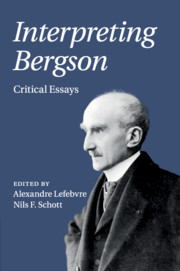Book contents
- Interpreting Bergson
- Interpreting Bergson
- Copyright page
- Contents
- Figures
- Contributors
- Abbreviations
- Introduction
- Chapter 1 Bergson’s Theory of Truth
- Chapter 2 What Was “Serious Philosophy” for the Young Bergson?
- Chapter 3 Bergson and Naturalism
- Chapter 4 Bergson on the True Intellect
- Chapter 5 Bergson’s Philosophy of Art
- Chapter 6 Bergson, the Time of Life, and the Memory of the Universe
- Chapter 7 Bergson and Philosophy as a Way of Life
- Chapter 8 Bergson and Social Theory
- Chapter 9 Bergson and Political Theory
- Chapter 10 Bergson, Colonialism, and Race
- Chapter 11 Bergson’s Philosophy of Religion
- Bibliography
- Index
Chapter 10 - Bergson, Colonialism, and Race
Published online by Cambridge University Press: 22 November 2019
- Interpreting Bergson
- Interpreting Bergson
- Copyright page
- Contents
- Figures
- Contributors
- Abbreviations
- Introduction
- Chapter 1 Bergson’s Theory of Truth
- Chapter 2 What Was “Serious Philosophy” for the Young Bergson?
- Chapter 3 Bergson and Naturalism
- Chapter 4 Bergson on the True Intellect
- Chapter 5 Bergson’s Philosophy of Art
- Chapter 6 Bergson, the Time of Life, and the Memory of the Universe
- Chapter 7 Bergson and Philosophy as a Way of Life
- Chapter 8 Bergson and Social Theory
- Chapter 9 Bergson and Political Theory
- Chapter 10 Bergson, Colonialism, and Race
- Chapter 11 Bergson’s Philosophy of Religion
- Bibliography
- Index
Summary
The chapter examines racist and colonialist assumptions in Bergson’s philosophy and outlines what is at stake in the various approaches to these assumptions that recent interpreters have taken. Focusing on two readers of Bergson, Léopold Sédar Senghor and Messay Kebede, the chapter shows how the Négritude movement deployed a Bergsonian epistemology to challenge the dominance and domination of a European conception of rationality, mobilizing instead what Senghor calls an “embracing reason.” Critically assessing recent identifications of racism, the racialization of bodies, and whiteness as a transcendental norm in Bergson’s philosophy, the author concludes that Bergson cannot altogether escape the charges, given that his central distinction between open and closed in Two Sources relies on a notion of “primitives” as an indispensable foil for the achievements of the mystics. The question then becomes to what extent Bergson’s thought can be mobilized to remedy the evils it cannot wholly be extricated from. In conclusion, the essay surveys contemporary appropriations of the conception of the open society and suggests that Senghor’s rearticulation of Bergson’s intuition as sympathetic "embracing reason" offers theoretical and practical ways to address racist and colonial discourses.
Keywords
- Type
- Chapter
- Information
- Interpreting BergsonCritical Essays, pp. 172 - 192Publisher: Cambridge University PressPrint publication year: 2019
- 1
- Cited by

